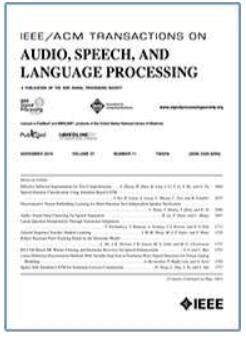利用环境表征进行选择性记忆元学习,实现声音事件定位和检测
IF 5.1
2区 计算机科学
Q1 ACOUSTICS
IEEE/ACM Transactions on Audio, Speech, and Language Processing
Pub Date : 2024-08-29
DOI:10.1109/TASLP.2024.3451974
引用次数: 0
摘要
环境变化和冲突给基于学习的声音事件定位和检测(SELD)方法带来了巨大挑战。SELD 系统在特定的声学环境中经过训练后,在不同的声学环境中往往显示出有限的泛化能力。此外,获取空间声音事件注释样本的成本也很高。在新环境中部署 SELD 系统需要大量时间进行重新训练和微调。为了克服这些挑战,我们提出了环境适应性 Meta-SELD,旨在使用最少的数据高效地适应新环境。我们的方法特别利用了计算合成的空间数据,并在预先训练好的、与环境无关的模型上采用了模型诊断元学习(MAML)。然后,该方法利用来自各自环境的有限样本,快速适应未知的真实世界环境。受 "学会遗忘"(Learning-to-Forget)方法的启发,我们引入了 "选择性记忆"(selective memory)的概念,作为解决跨环境冲突的策略。这种方法包括选择性记忆目标环境相关信息,并通过选择性衰减模型参数来适应新环境。此外,我们还引入了环境表征来描述不同的声学环境,从而增强了衰减方法对各种环境的适应性。我们在索尼-TAu 真实空间声景 2023(STARSS23)数据集的开发集和计算合成场景上评估了我们提出的方法。实验结果表明,与传统的监督学习方法相比,我们提出的方法性能优越,尤其是在定位方面。本文章由计算机程序翻译,如有差异,请以英文原文为准。
Selective-Memory Meta-Learning With Environment Representations for Sound Event Localization and Detection
Environment shifts and conflicts present significant challenges for learning-based sound event localization and detection (SELD) methods. SELD systems, when trained in particular acoustic settings, often show restricted generalization capabilities for diverse acoustic environments. Furthermore, obtaining annotated samples for spatial sound events is notably costly. Deploying a SELD system in a new environment requires extensive time for re-training and fine-tuning. To overcome these challenges, we propose environment-adaptive Meta-SELD, designed for efficient adaptation to new environments using minimal data. Our method specifically utilizes computationally synthesized spatial data and employs Model-Agnostic Meta-Learning (MAML) on a pre-trained, environment-independent model. The method then utilizes fast adaptation to unseen real-world environments using limited samples from the respective environments. Inspired by the Learning-to-Forget approach, we introduce the concept of selective memory as a strategy for resolving conflicts across environments. This approach involves selectively memorizing target-environment-relevant information and adapting to the new environments through the selective attenuation of model parameters. In addition, we introduce environment representations to characterize different acoustic settings, enhancing the adaptability of our attenuation approach to various environments. We evaluate our proposed method on the development set of the Sony-TAu Realistic Spatial Soundscapes 2023 (STARSS23) dataset and computationally synthesized scenes. Experimental results demonstrate the superior performance of the proposed method compared to conventional supervised learning methods, particularly in localization.
求助全文
通过发布文献求助,成功后即可免费获取论文全文。
去求助
来源期刊

IEEE/ACM Transactions on Audio, Speech, and Language Processing
ACOUSTICS-ENGINEERING, ELECTRICAL & ELECTRONIC
CiteScore
11.30
自引率
11.10%
发文量
217
期刊介绍:
The IEEE/ACM Transactions on Audio, Speech, and Language Processing covers audio, speech and language processing and the sciences that support them. In audio processing: transducers, room acoustics, active sound control, human audition, analysis/synthesis/coding of music, and consumer audio. In speech processing: areas such as speech analysis, synthesis, coding, speech and speaker recognition, speech production and perception, and speech enhancement. In language processing: speech and text analysis, understanding, generation, dialog management, translation, summarization, question answering and document indexing and retrieval, as well as general language modeling.
 求助内容:
求助内容: 应助结果提醒方式:
应助结果提醒方式:


